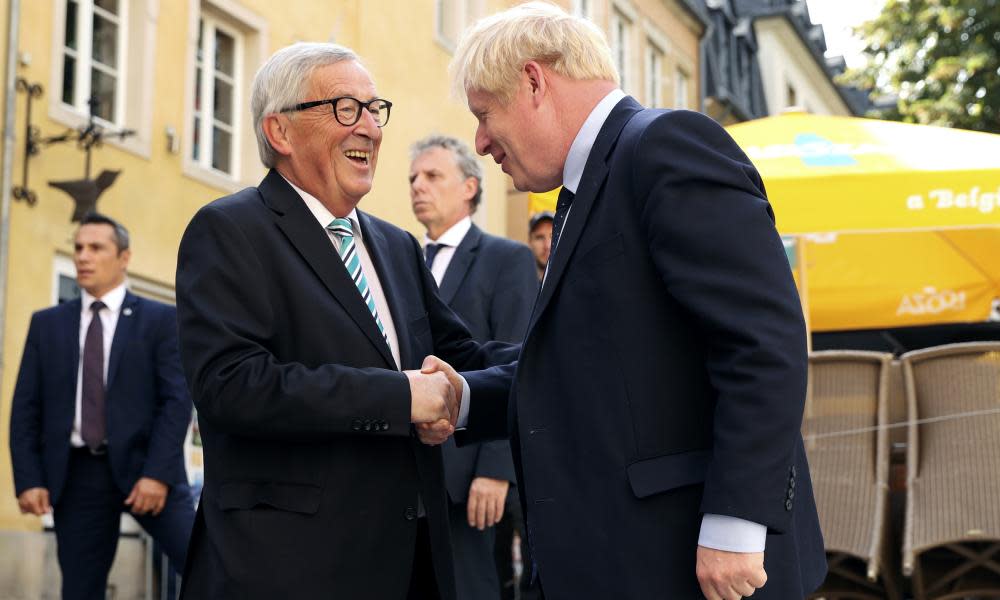Johnson dependent on Labour MP votes for any Brexit deal

Boris Johnson will still need a bloc of Labour MPs to vote for any Brexit agreement struck with the EU, even if his whips have managed to reduce the number of Tory Eurosceptic “Spartans” holding out against a deal down to just eight.
The prime minister insisted again on Monday that he wants a deal with Brussels that removes the Northern Ireland backstop. But even if he secures some concessions that he can sell as a new deal, his chances of getting that agreement through the House of Commons remain extremely finely balanced.
On the current numbers, he has 287 MPs who voted for a deal last time, while there are 289 MPs from opposition parties and independents who are against a deal.
Johnson would need to reach a total of 319 MPs to win a vote, discounting Sinn Féin MPs, the speaker and his deputies, who all do not vote, and three Labour MPs who abstained last time round.
Analysis by the Guardian shows there are about 60 MPs who potentially could go either way. These include 28 Spartans who refused to vote for Theresa May’s deal but could potentially be persuaded to back a Johnson-led agreement, plus 10 DUP MPs who Johnson is trying to sign up to his new plan for a watered-down version of a Northern Ireland-only backstop.
Tory sources have told the Sun that the Conservative whips believe that the 28 rebels can be squeezed down to about eight of the hardest Eurosceptics. But even in the best case scenario for the prime minister of an extra 20 Tories and 10 DUP MPs on board, Johnson would still need some Labour votes to very narrowly squeeze a deal through the Commons.
There are 26 Labour MPs who have signed a letter publicly urging Jeremy Corbyn to try to strike a Brexit deal before 31 October, of whom five have already previously voted for a deal and one abstained. Of the remaining bloc of 21, many of them would want to see at the very least concessions offered by May during talks with Labour enshrined in the agreement before voting for it, but several have indicated to the Guardian they are getting to the point where they are likely to vote for almost any agreement to end the impasse and avoid a second referendum or no-deal situation.
The closeness of the numbers would be likely to put huge pressure on individual MPs and lead to some big personal decisions. Jo Johnson, the prime minister’s brother who resigned from his top team over Brexit, previously voted against May’s deal because of his support for a second referendum, but could potentially switch sides this time.
The British government’s version of Brexit involves the UK ultimately leaving the single market and customs union, requiring the return of a range of checks on goods crossing the border between Northern Ireland and the Republic of Ireland. The “backstop” is intended as a standstill placeholder to ensure such checks do not have to be imposed between Brexit happening with a deal, and the start of a new free trade agreement yet to be negotiated between the UK and the EU.
Theresa May's withdrawal agreement proposed keeping the whole of the UK in a shared customs territory with the EU during this period. An alternative idea involves only Northern Ireland staying in the EU’s customs territory. That would place a customs border in the Irish Sea. May described it as a threat to the constitutional integrity of the UK, but the new prime minister, Boris Johnson, has opened the current talks by proposing an all-Ireland agri-food zone. The suggestion is that he will seek to quietly build on that with further NI-only arrangements.
Given an NI-only backstop was an EU proposal in the first place, the U-turn would be warmly welcomed in Brussels, although attempts to give the Northern Ireland assembly a veto on its continuation would not be acceptable, and the DUP would be unlikely to support the prime minister in such a move in parliament.
If there is a no-deal Brexit, then there is no backstop.
Sir Norman Lamb, a Liberal Democrat MP, is also now on the record expressing support for some sort of deal, which goes against his party’s new policy of being in favour of revoking article 50.
A source close to one pro-deal cabinet minister said Johnson had not yet started wooing Labour MPs but that would come at the last minute if it appears more likely that an agreement palatable to the DUP is taking shape.
The source said most of the Spartan Tories have, politically, “nowhere else to go” now that the prime minister is mandated by law to request an extension on 31 October if no deal is passed.
Related: Johnson: no transition period extension if Brexit deal is struck
A cross-party group of MPs last week formally launched a campaign to win support in the Commons for Brexit via a managed deal, arguing both a no-deal departure or a second referendum would cement political divisions and cause endless uncertainty.
The organisers – including the Labour MPs Caroline Flint and Stephen Kinnock as well as Lamb and the former Tory Rory Stewart – claim up to 50 MPs so far may back the plan, which would involve using elements of May’s Brexit proposals as the basis for an agreement which Boris Johnson could steer through parliament, possibly in time for a 31 October departure.

 Yahoo News
Yahoo News 
